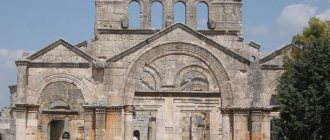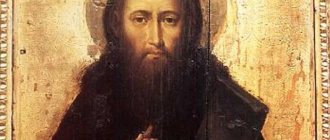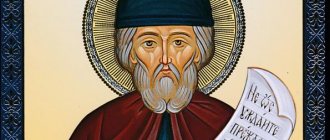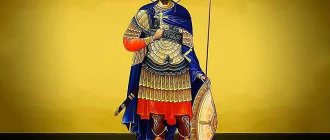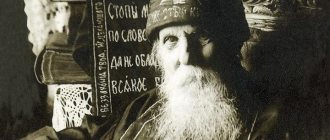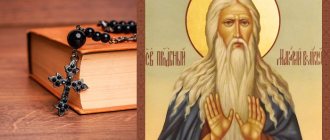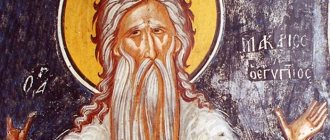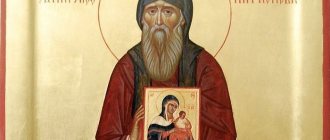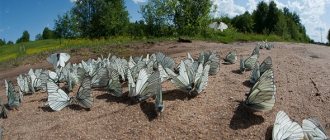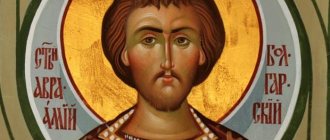Paphnutius Borovsky is an Orthodox saint, monk. Memorial Day May 1 (old style), May 14 (new style).
One day a man grumbled greatly and spoke badly about the Borovsk monastery. In a dream, he dreamed that Elder Paphnutius himself was standing in front of him and telling him to be kicked out of the temple for his words about the holy place.
And then two black Ethiopians appeared, grabbed the man and threw him out of the temple, beating him severely. When the man woke up, he cried bitterly and immediately ran to the elder to apologize to him.
Paphnutius Borovsky - Orthodox saint, monk of the Russian Orthodox Church
Life of Saint Paphnutius of Borovsky
The great-grandfather of the future abbot came to the Russian lands as part of the army of Batu Khan. He became a baskak here - a Tatar tax collector. The grandfather of Paphnutius Borovsky also did this, but converted to Orthodoxy when retaliatory persecution of the Tatars began. Paphnutius's parents were virtuous Christians, his father's name was John, his mother's name was Photinia.
The future saint was born in 1394 near Borovsk, now in the Kaluga region. The boy was named Parthenius at baptism. He grew up in a highly spiritual environment, studied well, and read the Holy Scriptures with rapture. He was distinguished by his good nature, meekness, seriousness, and chastity.
At the age of 20, he became a monk, like his three brothers. For 30 years he lived in the Pokrovsky Monastery, by order of the abbot he passed obedience under Elder Nikita, and he was once a novice under Sergius of Radonezh. Through his zealous service to the Lord and numerous virtues, Paphnutius earned the respect of the brethren. And when Abbot Marcellus died, the monks unanimously elected Paphnutius in his place.
The new abbot took care of the well-being of the monastery and was the best example of virtues. He worked hard all day and spent his nights in prayer. Paphnutius served as rector of the Intercession Monastery for 13 years. At the age of 45 he became seriously ill and, awaiting his death, became a schema-monk. But death did not come, which the abbot took as a sign from the Almighty.
When the illness subsided, Paphnutius renounced the rank of abbot and went to a calm and secluded place on the banks of the Protva. The brethren gradually joined him. In 1444, a monastery arose on the banks of the Protva tributary. The local Church of the Nativity of the Blessed Virgin Mary was at first wooden, but later a stone one was erected in its place. The monastery of St. Paphnutius was considered one of the most prosperous; almost a hundred monks lived in it.
The Monk Paphnutius of Borovsky was a strict ascetic: he took the worst food at meals, wore old clothes and shoes, minimized the use of household appliances, and ignored amenities.
Suffering poor and rich people came to the elder from all over the world; he talked with everyone, taught them, and consoled them. Pafnuty Borovsky loved and pitied modest and meek people, and treated proud people strictly. He took care of the disadvantaged, and in times of famine he could deprive the monastery of supplies, distributing everything to the hungry. Being an ardent guardian of chastity, he did not allow anyone to touch him, and did not allow women into the monastery.
He was always the first to attend prayer services and took on the most difficult work:
- plowed the ground;
- chopped wood;
- took care of the garden trees;
- weaved fishing nets.
When the holy elder turned 83 years old, the Lord notified him in April 1477 of his imminent death. The last days of his life, Paphnutius Borovsky prayed frantically, did not allow anyone except the brethren to come to him, managed to take communion, and attend the liturgy several times. The Monk Paphnutius departed into another world on the evening of May 1 (according to the old calendar) 1477.
In 2016, in Borovsk, near the Church of the Intercession of the Blessed Virgin Mary, a bronze monument was erected to the holy elder.
The Monk Paphnutius was born in 1394 into an Orthodox family
The Monk Paphnutius was born in 1394. The life indicates that his parents, John and Photinia, were Orthodox people. From childhood, the boy was raised to love God and the church.
Already at the age of 20, the boy became a monk with the name Paphnutius in the Intercession Monastery near Borovsk. He was given under the leadership of the disciple of St. Sergius of Radonezh - Nikita of Serpukhov. The disciple of St. Sergius taught Paphnutius everything, monastic and monastic virtue, and it was with him that he studied for seven whole years.
The disciple of St. Sergius, Nikita of Serpukhov, taught Paphnutius everything, monastic and monastic virtue, it was with him that he studied for seven whole years
In 1426, Saint Photius ordained Paphnutius to the priesthood. Saint Paphnutius had love and respect among his brethren. After Abbot Markell died, everyone unanimously decided to appoint Paphnutius to the position of rector of the Vysoko-Pokrovskaya monastery. For 33 years Paphnutius was abbot and confessor here.
When he turned 51, he became seriously ill. Then he decided to accept the great schema. But, miraculously, he received healing on the feast of St. George the Victorious. In 1444, he and one of his disciples left the monastery and settled on the banks of the Protva River.
Here he founded the Borovsky Monastery in honor of the Nativity of the Blessed Virgin Mary. Very many came to him to labor and live and pray under his spiritual guidance. Everyone who came to him built himself a cell and carried out obedience.
From the very foundation of the Borovsky monastery, Paphnutius carried out all obediences, thereby setting an example for his brethren
From the very foundation of the Borovsky monastery, Paphnutius carried out all obediences, thereby setting an example for his brethren. He was the last one to go to bed. During the construction of the new temple, Paphnutius carried stones and water on his back, dug the earth himself for the fence of the monastery, carried logs and chopped wood himself. In his free time, he read holy books and wove a fishing net.
On Wednesdays and Fridays the saint did not eat anything. And on ordinary days he ate coarse, simple food. He dressed very simply, in old, worn things. They said that when a proud man came to the monastery, he, not recognizing the abbot, pushed Paphnutius, and then asked the abbot of the monastery.
The miraculous deeds of the saint
Saint Paphnutius of Borovsky received many miraculous abilities as a reward from the Almighty. He:
- prophesied;
- saw prophetic dreams;
- He healed the mentally and physically sick;
- he saw through a person, knew how to read the soul, free him from vices.
The Borovsky elder became famous during his lifetime as a miracle worker and healer. A lot of written evidence of the miraculous deeds of the Monk Paphnutius has been preserved; below are only the most remarkable of them.
One day before Easter, the monks were saddened by the lack of fish. Paphnutius ordered them not to anger the Almighty, but to hope for a successful outcome of the problem. That same evening, a monk who came to the river noticed that the water had overflowed, pushing a large number of large fish onto the shore. The catch was such that the monks served fish twice a day throughout Easter week.
Saint Paphnutius forbade the icon painters who arrived to work at the monastery church to eat meat. But the icon painter Dionysius was tempted by lamb meat and brought it to the monastery. As soon as he tasted the forbidden food, he saw that it was full of worms. Soon after this, Dionysius' body was covered with scabs. The icon painter repented, then the abbot held a prayer service, cleansed the patient’s body with holy water, after which not a trace remained of the scabs.
One day one of the monks went to the village on business, and there he was seduced by feminine charms. The Borovsky elder saw in a dream the Garden of Eden, and in it one tree was uprooted and fell to the ground. When the monk returned, Paphnutius persuaded him to confess and helped him correct himself with wise instructions and teachings.
A forest grew around the monastery, abundantly populated by animals and birds. Forest crows flew up to the very monastery walls, the abbot loved to watch them. Once a hunter was driving past the monastery, saw a flock of crows in the sky, and killed one bird with a bow. And then he realized with horror that his head, raised to the sky, could not return to its original position. In despair and repentance, the hunter rushed to the venerable elder and asked for forgiveness for the killed raven. Paphnutius Borovsky called a prayer service, crossed the hunter, and he was healed.
There is a legend that Princess Elena Glinskaya prayed to the holy elder for conception. Thanks to her prayers, Tsar Ivan the Terrible was born.
One night, thieves stole three monastery bulls, but got lost, and until the morning, as if blind, they wandered around the monastery. In the morning they wanted to abandon the bulls and run away, but an unknown force chained them to the spot. They stood there until they were found by monks who went in search of the missing cattle. The thieves were taken to the monk. Paphnutius gave them orders not to steal anymore and sent them on their way.
One day, generous princely alms were delivered to the monastery. But the man who brought it took part of it for himself. The Borovsky elder revealed this secret, thanks to his insight, but remained silent. He ordered the guest to be fed. As soon as the thief started eating, he immediately became numb. He was healed only after repentance.
Paphnutius said that the queen of all virtues is alms that must be given
Paphnutius said that the queen of all virtues is alms, only she can save from hell those who had no other virtue at all. When there was famine, Saint Paphnutius fed everyone who came to him in the monastery.
The brethren sometimes grumbled that the elder was wasting too much, but he gave them an example of how the Grand Duke Ivan Kalita gave alms to all the poor without refusal. Soon the monastery’s reserves were depleted, but through the prayers of the Borovsky abbot, the next year the Lord sent the monastery such a large harvest that nothing like this had ever been seen before.
Paphnutius was very kind, he always believed in God’s power and help. One day it happened that there were no fish at all in the monastery. The brethren began to grumble dissatisfiedly with the elder. Then the elder went to the source to draw water for the liturgy, when he saw a huge number of fish. Then so many fish were collected that had never been collected before.
With his prayers, Elder Paphnutius multiplied everything several times. When there was not enough fish for the brothers, he prayed, and the Lord gave him what he asked for.
One day the elder asked a prince to catch fish for three days for the benefit of the monastery. I gave him a few hryvnia so that he could buy large vessels for salting fish. The prince agreed, because he knew that the catch was always bad, which meant that he would spend very little time on it.
The abbot strictly ordered to do what he said. The prince went reluctantly to do what was said, but then he was very surprised, because in three days he caught a huge amount of fish.
On the icon - Paphnutius is depicted in simple clothes, with a schema on top of it
An icon was painted to Saint Paphnutius. It depicts an old man in simple clothes. In one hand he holds a scroll with a prayer, and his other hand is folded in the Orthodox way.
In the icon, Paphnutius holds a scroll with a prayer in one hand, and his other hand is folded in the Orthodox way
What do they pray to him for? They pray to the saint:
- about getting rid of hunger;
- about protection from bad thoughts;
- about solving material and everyday problems;
- about the healing of mental and physical illnesses.
A prayer was written to Paphnutius, which can be read at home in front of the icon.
Prayer:
O sacred head, earthly angel, heavenly man, great miracle worker, Reverend Our Father Paphnutius! We earnestly resort to you with faith and love and tenderly ask for your intercession. We do not dare, for our sake, with the freedom of the children of God to ask our Lord and Master for mercy and forgiveness.
But we offer you a prayer book to Him that is favorable and we pray: ask us from His goodness for gifts that are useful and saving for our souls: right faith, standing strong in piety, forgiveness of sins, perfect correction of life, so that by turning from evil deeds to pleasing God, we may not anger the Lord of saints. His commandments are a crime. Pray, holy of God, to the Most High Creator to grant peace and piety to our Orthodox country. Preserve, O servant of Christ, your holy abode, which you have created, and all who live and labor in it are free from all evil.
Look mercifully upon the people in front of your relics, and fulfill all their requests for good. For all of us, spiritual and physical health, fruitfulness of the earth, a quiet and God-pleasing life, a good Christian death and a good answer at the Last Judgment from the All-Merciful God. To her, Father, we know that your prayer can do much before the face of the Almighty Lord, and nothing is impossible for your intercession, unless you only desire it: for this reason we firmly trust in you, and we greatly hope for your holy prayers, as if you will bring us through your intercession, to the quiet haven of salvation and the heirs of the bright Kingdom of Christ.
Do not disgrace our hope, miracle-working saint, and grant us, together with you, the bliss of Paradise, let us glorify, praise and magnify the great mercy towards us of the Lover of God, the Father and the Son and the Holy Spirit, and your good fatherly intercession forever and ever. Amen.
Father Paphnutius, pray to God for us!
By leaving a comment, you accept the user agreement
Holy spring
In addition to the pilgrimage to the monastery, believers also visit other places that are associated with it. They say there is a certain strength and peace there. These include the holy spring of Paphnutius and the icon. There are different opinions about whether the saint was here or not. But they have no confirmation. Therefore, in most cases everything is based only on legend. A chapel was built above it, and then a bathhouse.
The best article for you, go to: St. Tikhon Belavin, Patriarch of Moscow
After the revolution, the place was abandoned. Only in the 80s its work was restored again. Soon the water was blessed there. To believe in it or not is everyone's business. But remember that faith sometimes works such miracles that cannot be explained by any scientific arguments.
God bless you!
You will also be interested in watching a video story about Saint Panfutius:
How to get there
Finding out where the Borovsky Monastery is located and how to get to it is quite easy; there will be many signs along the way.
Personal car: along the Kievskoe highway to Balabanovo (about 90 km from Moscow), then drive towards Borovsk until the fork. We turn left, pass Rusinovo, then in Ryabushki on the left there will be a sign to the Borovsky Monastery.
There is free parking near the monastery. But it is worth considering that on weekends and holidays there are a lot of cars and excursion buses. So you can’t always count on being able to park close to the entrance to the monastery.
Coordinates: 55.21391, 36.53263.
You can get there from Moscow by public transport. Electric trains run from Kievsky Station to Maloyaroslavets or Kaluga. We get to Balabanovo station (just under 2 hours). Next, at the bus station we change to a bus or minibus to Borovsk. You need to get off at the “Ryabushki” or “Roshcha” stop, then walk.
And then our path lay to the city of Maloyaroslavets, where another ancient monastery with an unusual name is located: St. Nicholas Chernoostrovsky.
If you want to stay in these places longer, you can easily rent an apartment or a room on the Airbnb service, or through Booking book any hotel in nearby cities: Obninsk, Balabanovo, Borovsk, Maloyaroslavets or near them.
This trip took place on August 21, 2015. Read about other monasteries and churches that I was able to visit here. You can read about other attractions of the Kaluga region here. They are all marked on this map.
Write in the comments below which holy places you were able to visit and what made the strongest impression.
